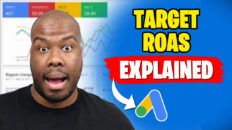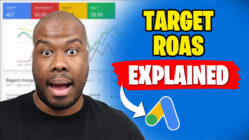Manual CPC bidding and manual bid adjustments are dead, and I will fight you on this on Google Ads. If you are doing manual bidding or adjusting bids manually, then you are running a risk of leaving so much money on the table and in this video. I’m gonna show you why. First of all, I’m going to explain the historic legacy manual bidding strategies used in Google Ads for both manual CPC bidding at keyword level, and also bid adjustments you can make in your account to optimize performance.
Understanding those, and then from there, I’m gonna break down exactly why. You’re doing it wrong, and that’s the wrong thing for you to be doing to your accounts. And look, I used to be a massive advocate for manually adjusting bids on Google Ads because it gave you the advertiser, the power to optimize your performance.
You were in control of your destiny. But I’ve got news for you the way Google Ads is going and the way Google ads now is. You are no longer in control as much as you’d like to be. This simply comes down to two things, smart bidding versus manual bidding. And the simple fact is smart bidding will win in pretty much every single use case that I’ve seen in 2023, and I’m sure in beyond it will win every single time.
So what are these manual bidding strategies that people are using? I’ve seen so many accounts this year where I’ve transitioned them from manual CPC and manual bid adjustments. Over to a smart bidding strategy, and the results have been fantastic, and starting with manual CPC, of course, this is where you at keyword level can control the individual bids for your keywords telling Google, Hey, this is the most I’m willing to pay for a click for this particular keyword.
Do not go above it. And that’s it. Google will honor that decision. Unless, of course you use manual CPCs, slightly Smarter brother, which is E C P C, and that will allow Google to have a little bit of wiggle room to optimize bids at the point of auction to go above the bid that you’ve set at keyword level.
So kind of a hybrid approach. Then you move on to adjusting bids across audiences, across locations and times of day. And also devices. You can adjust bids on all of these different factors in Google Ads and. Back in the day, it was a fantastic way to optimize campaigns because if you saw lower performance on different times of the day, different devices, different locations, you could just slide the bids around and make sure that your performance benchmarks were hit by moving those bids on those different factors within your account.
But you see, the problem with this approach is Google have completely changed what works and what doesn’t work for one simple reason, and that is it is no longer. About the keyword. It is about the person searching. Let me say it again. It is no longer about the keyword. It’s about the person searching.
It’s all about their intent. It’s not about, this is the keyword I want to show for, and this is the keyword that’s getting conversions. Therefore, I’m going to bid X on this keyword. What you really want to do is say, here’s what I’m promoting, and here is the keyword list I have. Google, use this list and find me customers, because the simple fact is, although we can see all of these different signals in Google ads in terms of location, devices, time of day, et cetera, and we can adjust bids on all of these factors to improve performance, Google can see way more than that.
Google can see way more signals at the point of auction than we’ll ever be able to see in the account. So let’s understand this from a past versus present perspective. Take a look at this. This is the chart that shows you what can and can’t be adjusted in Google Ads right now when running manual bidding strategies.
So manual CPC, ECPC, these are the kind of things you can adjust. You can adjust your device location, ad schedule, targeting method, remarketing lists for search ads. All of these different types of things, including demographics for both search campaigns and mostly for display campaigns. But other [00:04:00] campaign types too have a lot of options, particularly around device, location and ad schedule that you can adjust when using a manual strategy.
Now let’s flash forward to the present where most people, and I advocate for this in this very video, you should be using a smart bidding strategy and if you’re using a smart bidding strategy, Take a look at this. You can see here that all you can do is really adjust device level bidding to some degree, and with a maximized clicks strategy, which is of course smart bidding, but kind of dumb smart bidding because you’re not really bidding towards a business goal, more a vanity project.
So let’s leave that aside. With the exception of maximized clicks, you’re basically only able to adjust bids based on device, and you can’t make slight adjustments than a lot of cases. You can only do minus 100% only. And that means if you don’t want to show on mobile devices, Google still gives you the power to do that.
But if you’re noticing conversions are coming in a bit more pricey on mobile devices and you wanna do like a 50% bid adjustment, You can’t, and it all kind of makes sense when you understand that Google can see way more than the average user of Google Ads interface, and it means it can make better decisions for optimizing your bids at the point of auction.
So Google are gonna take that lever away because, Your humanly hands are gonna get in the way of Google’s AI smart bidding. And Google doesn’t want that for better or for worse for your campaigns. And as I say, I used to advocate for having all of the levers of control as an advertiser, and it was something that meant us.
PPC experts could actually do more when it came to optimizing performance. But since Google’s smart bidding has improved massively, particularly again around using broad match now, it doesn’t make any sense because I have seen the most niche B two B campaigns. With very, very narrow focuses with low traffic, with low volume that I optimized to the nth degree.
With all kinds of bid adjustments, I have transitioned them onto a smart bidding strategy using a broad match approach, and the results have improved by 15% with one particular advertiser. Anyway, it’s improved significantly, and the worst part about this is all of my adjustments are gone because as I showed you, Google doesn’t honor them when you go onto a smart bidding strategy like Target ROAS or Target CPA, when you are using smart bidding.
So that is kind of a kick in the teeth for me as a PPC expert, knowing that my optimizations that have been working for years with this particular client, I. Have now been done by Google with a like for like campaign and improved upon with less controls in my hands. So where does this leave us? Where does this leave people running P P C campaigns trying to get results using all of the measures at their disposal?
Well, nothing fundamentally changes. You still have the ability to control the success or failure of a campaign. You have less levers to pull. Correct. But there are still plenty of decisions you need to make to get good results for your campaign. And there are so many factors to think about, like your ad creative, like your choice of keywords, even while you still can, your keyword match types can play a role in this.
I’m not advocating broad match for everybody, but if you using an exact match and phrase match, you can still get great results. Of course, pairing that with smart bidding. So in a nutshell, I’m telling you this, and the reason I made this video is because I am saying explicitly there is no reason to use manual CPC or ECPC on your Google Ads search campaigns.
Going forward, there is no excuse. I think you should be testing smart bidding if you haven’t done already, and don’t be scared to do so because your results are gonna start declining. When your competitors are taking advantage of Google’s AI at the point of auction using all of their data points, you are gonna get left behind.
Your competitors are gonna excel. And where does that leave your business? Well, it leaves your business as dead as manual CPC. But if you disagree with me, I want to hear from you. I love discussing this kind of stuff. So hit me up in the comments down below. I would love to hear from you. Are you still using manual CPC?
Be honest. Are you getting results? Are you scared of moving over to a smart bidding strategy? Or have you tried a smart bidding strategy and been stung and it’s not worked out very well? Let me know in the comments. I’ll be really interested to discuss that down there with you. Like this video, if you like it, don’t forget to subscribe.
Don’t forget to head to darren-taylor.com for PPC consultancy and I’ll be more than happy to help your business succeed in the crazy place that is Google Ads.







